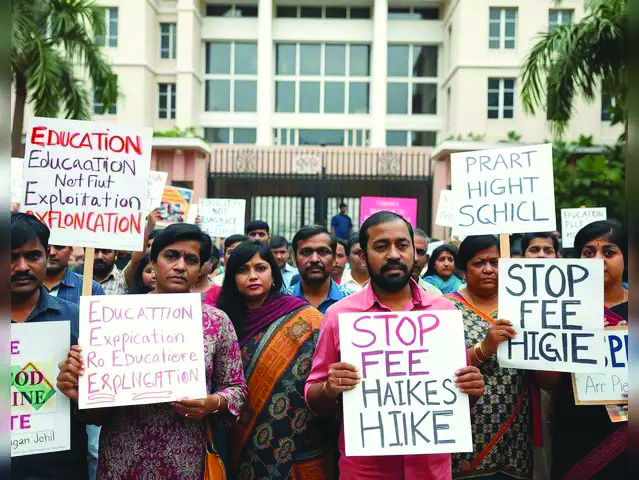Reshma Ravishanker (Bangalore)

Fee hike protestors in Bengaluru
Every April, it has become an annual ritual for parents and child rights organisations to protest tuition fee hikes of independent (‘unaided’) private schools for the academic year beginning June. On April 18, responding to a complaint of the Samruddha Bharat Foundation (SBF), a Bengaluru-based sociopolitical organisation that engages with academics, activists and policymakers to develop policy solutions, the Karnataka State Commission for Protection of Child Rights served notices to three CBSE-affiliated independent schools in Bengaluru for “unscientifically charging exorbitant fees”. The commission also wrote to the state’s department of school education recommending action against these schools if they failed to provide “reasonable explanation”.
Several parents’ associations in the state have protested that this year’s tuition fee hikes of 15-30 percent are “unreasonable” and way beyond the rate of inflation. “Why should schools increase fees every year by 10-30 percent when inflation itself is not even 10 percent? The increase of tuition fees should be pegged to inflation,” says Mohammed Shakeel, president, Voice of Parents, a Bengaluru-based parents’ association.
Moreover, in a statement on social media platform X, Voice of Parents accused private schools of “commercialization and profiteering”: “Sure, private schools have the right to establish and manage schools… They also have a right to fix their own fee but, as per numerous orders of the Supreme Court… they cannot profiteer or commercialise education. While schools are fixing their own fees, government has to determine if schools are commercialising education and profiteering, by appointing a fees determination committee.”
Private schools’ associations cite rising operational costs to provide quality education, including latest academic/sports/IT infrastructure and facilities, higher teacher salaries, training, etc.
D. Shashikumar, general secretary, Associated Managements of Private Schools in Karnataka, says education ministry rules permit private unaided schools to raise fees by 10-12 percent annually. “There are 48 components that contribute to determining fee increases, including rising costs of electricity, fuel, garbage collection, etc. Unaided private schools raising fees annually in the 8-15 percent bracket is necessary to provide quality schooling. However, I agree that 20-30 percent annual hikes decreed by some schools are unreasonable,” says Kumar.
The issue of government regulation of private school fees has been heavily litigated over the past half century with several high and Supreme Court pronouncements on the subject. In the landmark TMA Pai Case (2002), an 11-judge bench of the apex court held that unaided private education institutions have the right to administer themselves including determine their admission processes and prescribe ‘reasonable’ tuition fees. Most recently in 2021, in Society for Unaided Private Schools of Rajasthan vs. Union of India & Ors, the apex court ruled that the right to determine tuition fees payable by students is vested in every school’s “management alone” (in its interpretation of the Supreme Court’s judgement in the T.M.A. Pai Case), and that the government cannot interfere with this right even during emergencies such as the Covid pandemic.
Refreshingly, Karnataka education minister Madhu Bangarappa offered parents protesting tuition fee increases straightforward advice: “Government does not have the power to regulate private school fees. If we fix fees, private school managements go to court. Therefore, if parents cannot pay fees of private schools, they can enroll their children in government schools. In addition to good education, in government schools, they also get books, uniforms, milk, eggs, and midday meals free-of-charge.”
However, while recommending parents to enroll their progeny in government schools, the education minister is evidently not enamoured of the “good education” provided by public schools as he has enrolled his son, Surya, in the private independent top-ranked Bishop Cotton Boys School, Bengaluru, where according to widespread media reports he topped the ISC school-leaving exam with a 98.25 percent average.
In numerous dispatches on the issue of parent-school tussle over fee increases, EducationWorld has persistently warned against government regulation of fees as the thin end of a wedge, leading to stifling of institutional autonomy and leveling down education standards. With middle and even lower middle class parents avoiding government schools like the plague (despite the promise of “free books, uniforms, milk, eggs”), informed educationists advise that the best solution is for parents associations to collectively negotiate tuition fee increases with school managements.
Meanwhile ‘educated’ middle-class parents continue to protest inevitable tuition fee increments of private schools without raising voice against rock-bottom standards in government schools funded by taxpayers. Evidently, they are unaware that in developed OECD countries a mere 6-10 percent of children are enrolled in private schools as against 48 percent in India. If middle class India practiced active citizenship, they wouldn’t need to protest hikes of private schools.























